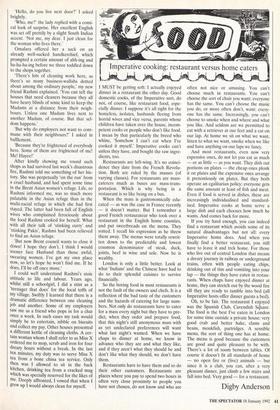r Imperative cooking: restaurant versus home eaters 1
nroLALARtt•
I MUST be getting soft: I actually enjoyed dinner in a restaurant the other day. Good domestic cooks, of the Imperative sort, do not, of course, like restaurant food, espe- cially dinner. I suppose it's all right for the homeless, isolates, husbands fleeing from horrid wives and vice versa, parents whose children have taken over the house, incom- petent cooks or people who don't like food.
I mean by that particularly the breed who whine, 'Somehow I can't eat when I've cooked it myself.' Imperative cooks can't unless they have, and bought the raw ingre- dients, too.
Restaurants are left-wing. It's no coinci- dence they date from the French Revolu- tion. Both are ruled by the masses (of varying classes). For restaurants are mass- caterers much as buses are mass-trans- portation. Which is why being in a restaurant is so like being on a bus.
When the mass is gastronomically edu- cated — as was the case in France recently
— it doesn't matter. But I remember a good French restaurateur who took over a restaurant in the English home counties, and put sweetbreads on the menu. They rotted. I recall his expression as he threw them away. The menus were totally rewrit- ten down to the predictable and lowest common denominator of steak, duck, joints, beef in wine and sole. Now he is wealthy.
London is only a little better. Look at what 'Indians' and the Chinese have had to do to their splendid cuisines to survive financially.
So the boring food in most restaurants is not the fault of the owners and chefs. It is a reflection of the bad taste of the customers and the hazards of catering for large num- bers. Not only do restaurants have to cater for a mass every night but they have to pre- dict, when they ordef and prepare food, that this night's still anonymous mass with as yet undeclared preferences will want what last night's wanted. When we have chaps to dinner at home, we know in advance who they are and what they like, and if they aren't what they should be and don't like what they should, we don't have them.
Restaurants have to have them and so do their other customers. Restaurants are places where you pay to spend two hours in often very close proximity to people you have not chosen, do not know and who are often not nice or amusing. You can't choose much in restaurants. You can't choose the sort of chair you want: everyone has the same. You can't choose the music you do, or more often don't, want: every- one has the same. Increasingly, you can't choose to smoke when and where and what you like. And seldom are we permitted to eat with a retriever at our feet and a cat on our lap. At home we sit on what we want, listen to what we want, smoke when we like and have anything on our laps we fancy.
And most restaurants, even now very expensive ones, do not let you eat as much — or as little — as you want. They dish out portions on plates — the cheap ones plonk it on plates and the expensive ones arrange it pretentiously on plates. But they both operate an egalitarian policy: everyone gets the same amount at least of fish and meat. Even if food is served in dishes, these are increasingly individualised and standard- ised. Imperative cooks at home serve a large dish and each chooses how much he wants. And comes back for more.
If you try hard enough, you can indeed find a restaurant which avoids some of its natural disadvantages but not all: every Imperative home does. And when you finally find a better restaurant, you still have to leave it and trek home. For those who live out of central London that means a dreary journey in railway or underground trains, often with people eating chips, drinking out of tins and vomiting into your lap — the things they have eaten in restau- rants. When chaps have enjoyed dinner at home, they can stretch out by the wood fire till they are ready to tumble into bed (all Imperative hosts offer dinner guests a bed).
Oh, to be fair. The restaurant I enjoyed was the Spanish Club, Cavendish Square. The food is the best I've eaten in London for some time outside a private house: very good crab and better hake, clams and beans, monkfish, partridges. A sensible menu, the sort of thing one has at home.
The menu is good because the customers are good and quite pleasant to be with.
There's a lot of room between tables. Of
course it doesn't fit all standards of home — no open fire or (live) animals — but
since it is a club, you can, after a very pleasant dinner, just climb a few stairs and fall into bed. Very good — for a restaurant.
Digby Anderson


















































 Previous page
Previous page